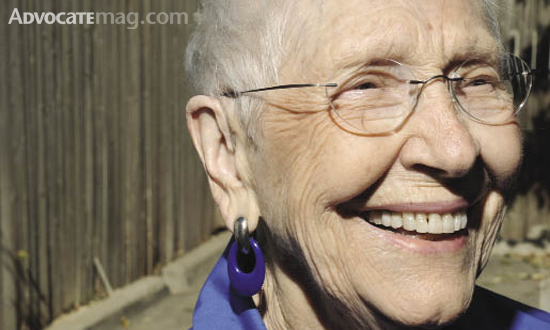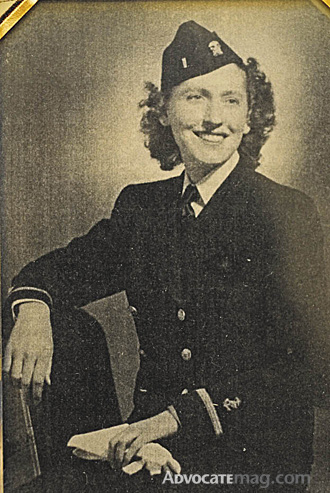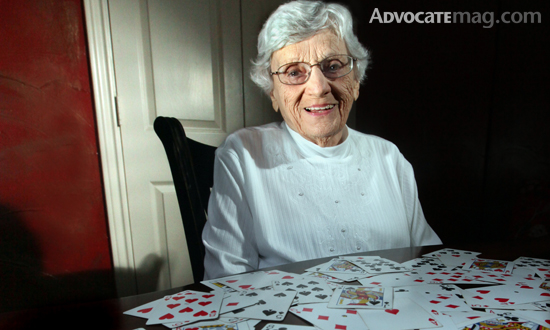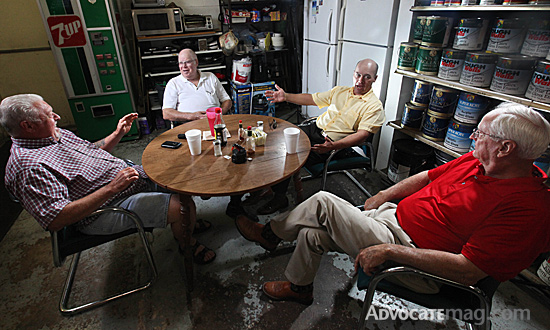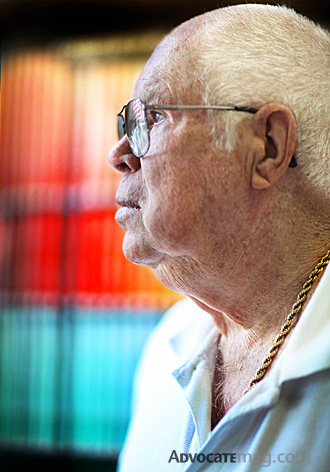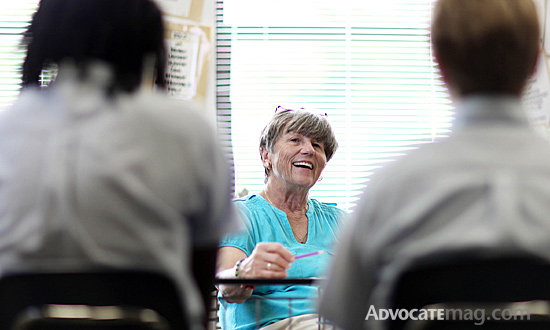70- to 90-somethings share the secrets to eternal (or at least very long lasting) youth
American Industrialist Henry Ford once said, “Anyone who stops learning is old, whether at 20 or 80. Anyone who keeps learning stays young. The greatest thing in life is to keep your mind young.”Ford touched on a secret that many Lake Highlands people have unearthed and embraced. Learning and doing create a motive for living well. These folks, some two decades past retirement age, are not ready to kick back and let the golden years quietly pass.
92-year-old miracle: Bernice Press
[youtube]http://www.youtube.com/watch?v=R4orABsUhEY[/youtube]Anyone who has ever said, “I am too old for that” needs to meet Bernice Press, a 92-year-old miracle. An encounter with Press is a wake-up call after which one can’t help but realize that before him or her lies a vast amount of possibility.
I am greeted in the lobby of C.C. Young’s Asbury building by an upright, smiling woman with a firm handshake and a strong voice.
“Hi, I’m Bernice,” she says.
Her cropped hair is pure white. An aura of color surrounds her — perhaps it’s the crisp blue blouse, matching watch and earrings, or the hint of rose on her lips and cheeks, or maybe it’s something less tangible. At a brisk pace, Press leads me to her first-floor apartment. She says she’s Bernice Press, but the Bernice Press I came to meet is 92 years old. Can this really be Bernice Press?
The coffee table scrapbook filled with honors, magazine articles and photos from a past life as a WWII-era nurse and an entrepreneur who, with her husband, started the country’s first laundromat prove she is who she claims to be.
What’s her secret? For one, each morning she stretches, showers, exercises and dresses for success.
“Every day, I am prepared for a date,” she says. Dry wit drives much of her dialogue.
She stays active during most mornings, doing various volunteer activities, and after lunch she relaxes and plays video games on her bejeweled iPhone.
“I’ve always been a curious person. Always wanted to do more, learn more, keep busy,” she says. Also, her mother lived to be 103, so maybe it’s in the genes, she adds.
When she was in her late 70s and had recently moved into C.C. Young (where her mother also lived), she began putting together new resident welcome bags for patients entering the health center.
She knew firsthand that being in the hospital was “the pits,” and the gifts seemed to lift spirits.
Shortly after this, the center opened a new wing and the number of patients jumped from 10 to 26. It is typical, she says, that a job she has taken on becomes bigger than expected. Good thing she doesn’t let large tasks deter her. These days, the staff at C.C. Young helps out with the welcome bags. When she decided to recognize war veterans living at C.C. Young, it also turned into a big job. Every November, you’ll find Press lining the hallway with photographs and stories of the more than 100 veterans (and counting) who are her neighbors.
The other residents call Press “Mrs. C.C. Young,” staffer Cameron Hernholm says. “Bernice has more energy and volunteers more hours of service than a teenage Boy Scout. She’s a miracle who seems to have found the fountain of youth.”
Because there is so much to do, Press says age 75 is the perfect age to move to a retirement community.
“Don’t wait until you’re old,” she says.
Since she arrived, Hernholm says Press founded the first support group for adult children of aging parents. She also facilitates the Alzheimer support group; she was on C.C. Young’s national championship Wii Bowling team; she traveled last year to Washington, D.C., as the one female among a group of WWII vets; she is the C.C. Young Auxilliary Club’s vice president. Off campus, she volunteers at the Dallas Bethlehem Center, a non-profit that helps South Dallas children.
In the 1930s, Press received a music scholarship and played the baritone during college. Her mom encouraged nursing school.
It’s no surprise that Press spent her early years as a nurse, loved for her bedside manner.
“Touching, listening, talking,” she says, is as important as the medical treatment. One of her patients, Leonard Press, married her. He was an entrepreneur, and in the 1940s, the pair opened up Leonard’s Self Serve Laundry Mat, the first of its kind, in Los Angeles. Years later, they also owned a country and western bar in East Texas, The Hitching Post.
Along the way, they adopted a Bolivian child, Carol, who recently celebrated her 60th birthday.
Carol is to thank for her mother’s aforementioned bling. “She goes to the shops along Harry Hines and buys earrings and watches,” Press says.
She opens a drawer containing dozens of colorful wristwatches. “I have one for every outfit.”
Norma the Great: Norma Ward
Lake Highlands resident Norma Ward — known simply as “Great” to her 10 great-grandchildren and one great-great-grandkid — is 92 and still going strong. She’s an avid volunteer with a special interest in autism, which has affected one of her grandchildren, and in the last few years, she has attended parties and dances and cruises and she drives herself to two bridge games a week. It’s enough activity to drain a person half her age.
She won’t tell you this herself, but daughter Lynn says her mother is frequently the high scorer at bridge. In fact, Ward won’t say much about herself and asks, in her intoxicating southern drawl, why anyone would want to write about her. She says she has several “more interesting” friends. Of course, they are all 20-30 years her junior.
Ward moved in with Lynn in 2004 — she came to visit and never left, she says. Because she is a member of the Beta Sigma Phi sorority, an international service and cultural organization, Ward has friends no matter where she lives.
When you move, they will let the local branch know you are coming, Ward says.
Not that she has any trouble making friends. Her first day in Lake Highlands, she dropped in on Ann Levy (whom we “should really be writing about”, Ward says) at Lake Highlands United Methodist Church.
“She had such a youthful attitude for a person of her maturity,” says Levy, who plays cards with Ward a couple times a week. She fits right in with the the 70- and 80-year-olds in the group, Levy says, and “she is a wonderful bridge player.”
Ward has shared stories and knowledge with Beta Sigma Phi members — she gave a well-received presentation on women’s suffrage, Lynn says.
“When my mother was born, women did not have the right to vote.”
She also told the organization about her trip to England during the time of Princess Diana and Prince Charles’ wedding.
“Every shop in town had wedding flowers in the windows, and we got to see her dress on display as well as the wedding gifts. I remember that a class of kindergarten students gave them a kitchen timer.”
Her daughter, Sue, who died of cancer at a relatively young age, was with her on that trip. It remains one of Ward’s happiest memories — she chokes up a little when talking about it.
Ward has spent a lifetime helping others, always volunteering with the Red Cross or United Way, but it was the things she did that no one knew about that make her so special, Lynn says. She recalls grade school, when Ward worked in the school office. There was a girl in the third grade whose parents were farmers, and she had no shoes and lice in her hair. Ward brought her home, picked the lice from her hair, made her food and took care of her.
“That was normal — she just naturally helped anyone without a second thought,” Lynn says.
Ward says she gets that from her own mother, “the most generous and kind woman you would ever meet.”
Ward has survived breast cancer and a heart attack — though she maintains that she doesn’t believe she had a heart attack — but her doctors say she is fit and doesn’t need to return for another two years.
When Lynn was a child, Ward’s mother lived with the family.
“She told me that, when she got old, not to ever let her live with me, that it was too hard,” Lynn says with a laugh.
Ward’s greatest gift to the world, she insists, is Lynn and her other three children. That contribution and its significance was evident at Ward’s 90th birthday party. Relatives and friends came in from as far as Maryland and California and booked four different hotels.
“It was a good birthday party,” Ward says. “People always ask me when I am going to have another party.”
Solving the world’s problems, over lunch: John Adams
At 79, John Adams could comfortably retire from Adams Paint Center, the store at Northwest Highway and Abrams he (and before him, his father) has owned and operated for decades, but he’s having too much fun. He arrives at the shop about 7:30 each morning. He works for a few hours
framing art and photography, which is a significant part of the paint store’s business, but by 10:30 a.m., he usually has prepared lunch/brunch for 4-8 people — maybe sandwiches, soup, meatloaf or chicken. Unfailingly, a small crowd will gather at about noon to break bread in the back room.
“You see — they are not just my customers. They are my friends,” Adams says.
Leah Ekmark, whose artist-father Fred is Adams’ longtime framing customer, says the lunchtime gatherings are remarkable. “You will find a variety of people gathered around his weathered table — cops, judges and other city officials, a retired horse jockey all the way down to your ordinary contractors. It’s a colorful crew.”
Among the attendees the days we visited was retired letter carrier Dick Barber, pro golfer Rives McBee, and Judge Ken Blackington from Mesquite. Conversation is as varied as the company but, Barber says, “This table has solved many of the world’s problems.”
An interesting, ever-changing and low-stress workload and stimulating friendships give Adams a reason to “get going each morning,” but he didn’t arrive at his golden years without having lived well all along.
Adams left high school to become a Marine, and he trained pilots during WWII. He has owned six Harley Davidson motorcycles. He has two Yamaha motorcycles now and recounts an accident in which he survived sliding along Northwest Highway after a car forced him to lose control of the bike.
“I got a ticket for failure to control my vehicle,” he says, “but I had a buddy on the force who helped take care of that.”
Adams and his wife did a stint on their farm in Nevada, Texas, raising racehorses, and they enjoyed some success, especially with one thoroughbred named Red Sun, a horse that Adams says “nearly paid for the farm.” There was also Ice Cool, Adams Aries, Lord Thomas (named for Adams’ dad), Come Rain or Shine, and Beau Bidder. His greatest contribution to society, in his opinion, is his involvement with Scottish Rite Masonry.
“Masonry takes a good man and makes him better. That’s how it was explained to me,” Adams says.
“When I was a young man living in Vickery — I was pretty mean back then — there were these few men who were very nice and polite and one day I asked them, ‘Why are you so nice?’ and they said, ‘We are Masons,’ and I said, ‘How do I become one?’ and they said, ‘You just did.’ After that, I got nicer.”
The Texas Scottish Rite Hospital for Children, which has treated more than 200,000 children free of charge since its inception in the 1920s, is one of the organization’s “pet projects,” Adams says.
Aside from the time on the ranch, Adams has spent his life in Dallas. He learned to swim in a lake where the Village Apartments are now located. He remembers the WWII POW camp at White Rock Lake and the skeleton recovered during the lake’s 1953 dredging. He’ll tell tales on acquaintances, including district attorneys, judges and mayors (“Henry Wade and Jack Evans were honest men,” Adams says. “I can’t say that for many of them”). He’ll regale his tablemates with stories about well-known friends, including Keller’s burgers’ Jack Keller and Campisi’s Egyptian Restaurant’s Joe Campisi — “he was the number one guy,” Adams says of Campisi. Without specificity, and with a raised brow and a wink, Adams notes the well-circulated rumors of Campisi’s mafia ties.
Adams, despite recent heart problems, still plays golf regularly (did we mention he was a good golfer? “Wasn’t anyone who could out-drive me back in the day,” Adams says). In fact, the day after we met Adams, he played in a charity tournament. He says he’s having a little trouble getting around, but that the event benefits impaired and in-need kids — his soft spot.
The Trigger show: Margaret Butler
Margaret Butler pulls aside a makeshift closet door in her classroom at St. John’s Episcopal School, revealing clothing racks stuffed with costumes.
When students walk into Mrs. Butler’s room, they could be entering an interpretation of mountains in Iraq or a Shakespearean set. Every day is different in Mrs. Butler’s class.
She teaches literature to sixth graders, and the novels they read always have to do with social studies. Costumes, puppets, funny hats, re-enactments and skits are the norm. The desks are never in the same formation from one day to the next.
In the hallway, above her classroom door, is a neon “Open” sign of the type that might be in a convenience store.
“We’re open to what these young people want to know and what they want to do,” she says. “It works.”
Butler is 72, and she gained the nickname “Trigger” in 1952 during a summer at Camp Longhorn in Burnet, Texas, where she tacked a picture of Roy Rogers’ horse near her bunk. The name kept following her until she ultimately embraced it. It fits, too. It’s cute, inviting and totally unintimidating. Kids are at ease around her, even, and especially, sixth-graders.
Trigger pulls one of them into the interview, a blue-eyed boy with brown hair and freckles named Carter Elliot.
“All the teachers here are completely amazing,” he says, after shaking hands. “It’s really fun being a sixth-grader.”
Wait. What? It’s really fun being a sixth-grader?
It’s fun when, as a sixth-grader, a kid walks into the classroom to find plastic building blocks in his way. He must traverse them while water splashes him and recorded gunfire plays from a boom box. For a moment, he is on a 10-inch-wide ledge on the side of the Zagros Mountains, risking life for freedom.
It’s just like what happens in the novel the class is reading, Kiss the Dust, about girls in 1980s Iran and Iraq.
All the world’s a stage, and Butler’s classroom is no exception. She also teaches speech, where eighth-graders learn how to groom and prepare for interviews and public speaking. It readies them for private high school admissions processes, which often involve interviews. When it’s time for speech, Butler’s classroom becomes an office with a receptionist, where students must check in and wait for their interviews. A few weeks earlier, it had been a fashion runway for them to strut their business-appropriate clothes.
On one wall of Butler’s classroom is a collage of faces, pictures of every single student she has had during the past 21 years at St. John’s. She remembers all of their names, and she keeps in touch with many of them.
“I want that spirit, a part of them, to stay right here,” she says. “We’re still connected.”
Butler’s children and grandchildren live in Alabama. Every spring, she asks herself whether this is the year she should retire. So far, the answer hasn’t changed.
“As long as I have gifts to offer, I would like to do that,” she says.

